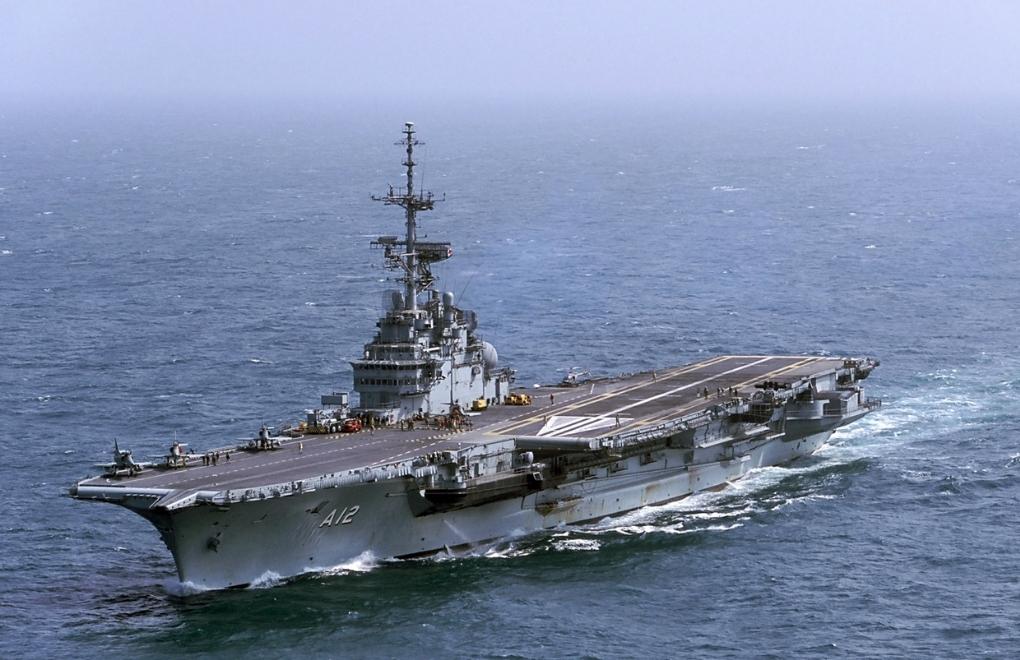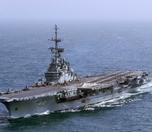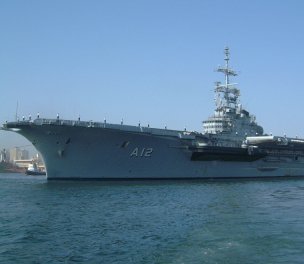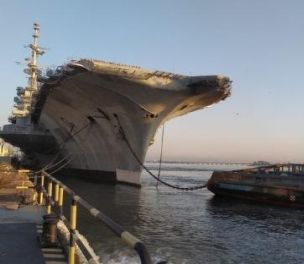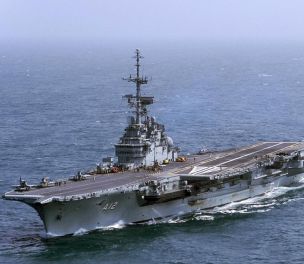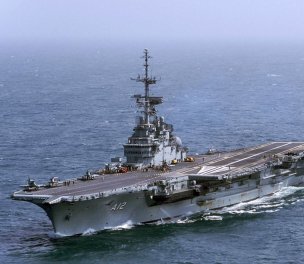Türkiye will not allow a decommissioned aircraft carrier belonging to Brazil's navy to enter its territorial waters, the minister of environment announced on Friday (August 26).
The decision was taken after Brazil failed to prepare a new hazardous materials inventory report, Murat Kurum said in a written statement.
CLICK - Brazil rejects Türkiye's request for new hazardous materials report
While those who opposed the deal welcomed the decision, the company that got the contract to scrap the ship, Sök Denizcilik, expressed its intentions to fulfill the contract.
The Aliağa Environmental Platform (ALÇEP), a local group in Aliağa, İzmir, where the ship was planned to be scrapped, tweeted, "This victory is ours. Friends of Aliağa, you haven't left us alone. This is just the beginning, struggle will continue!"
"We won! The ship is going back at full speed," Greenpeace Mediterranean tweeted.
"Organized struggle won; the approval for the São Paulo aircraft carrier has been revoked," the Turkish Medical Association (TTB) wrote on Twitter.
Sök Denizcilik, however, claimed that it had the second report asked by the ministry. The report was prepared by an internationally accredited firm before the ship left Brazil, and showed similar results to the first report, it said.
"We are ready and willing for the preparation of the third dangerous materials inventory report outside of Türkiye's territorial waters. We declare to the public that we will comply with the orders of our ministry, regardless of the decision," it said in a written statement yesterday.
"It is still on its way"
The ALÇEP, however, tweeted yesterday that the ship was still on its way to Türkiye, without specifying the source of the information
"Despite the ministry's decision, the ship is illegally heading to our district through international waters. We will stop the poisonous ship!" it tweeted.
Last year, Sök Denizcilik got the contract for the scrapping of the ship, causing concerns among environmentalists due to the high amount of hazardous substances, including asbestos.
Türkiye on May 30 granted conditional permission for the import of the ship, requesting a hazardous substance report before its entry to its territorial waters.
The Ministry of Environment on August 9 sent a communication to Brazil, requesting a second report before the ship left Brazil's territorial waters.
In response on August 22, the Brazilian Institute of Environment and Renewable Natural Resources (IBAMA) said the ship had already left Brazil's territorial waters by the time they received the communication.
Türkiye then decided to revoke the permission for the ship.
What happened?The NAe São Paulo, a decommissioned aircraft carrier belonging to Brazil's navy, is set to be dismantled in the Aliağa shipyard in İzmir, western Türkiye. A company named Sök Denizcilik got the contract for the dismantling of the vessel last year and was given clearance by the Ministry of Environment, Urbanization and Climate Change on May 30. The size of the São Paulo vessel and the harmful materials that can be released by dismantling the vessel, including asbestos, caused environmental concerns. Minister of Environment Murat Kurum on July 18 dismissed the reports that the vessel contained 900 tons of asbestos and said it contained only 9.6 tons of asbestos, citing a survey report. When the vessel enters Türkiye's territorial waters, it will be once again examined by "experts with international competence" and will be sent back immediately if there is a dangerous situation, he had said in a statement on his social media account. The report cited by Kurum was prepared by the Grieg Green company, according to the Demirören News Agency (DHA), which said it had obtained the survey report including information on how much asbestos is found in which parts of the vessel. However, the sister vessel of São Paulo, Clemenceau, was revealed to be containing more than 500 tons of asbestos during its dismantling in the mid-2000s, Evrensel newspaper reported. The government of France, which had built both vessels, initially stated in 2005 that the ship contained 160 to 200 tons of asbestos. Before the ship was dismantled in the UK between 2009 and 2010, analyses had found 760 tons of asbestos. |
Ship dismantling in İzmirAfter a ship accident on March 22, 2013, oil sludge spilled into the sea and the Çandarlı beach of Dikili district was covered with oil sludge. Two years after this accident, a tanker named Kuito with a daily oil processing capacity of 100,000 barrels, which was brought to Aliağa for dismantling, was investigated five times more radioactivity than limit values was detected. A lawsuit was filed for the cancellation of the dismantling but the İzmir 3rf Administrative court ruled for the stay of execution months after the ship was dismantled. A similar process happened with the ETHANE ship. In 2018, it was revealed that oil was deliberately discharged from a ship named Harrier and oil pollution was observed on Foça coasts. Substances such as mineral oils, heavy metals, polycyclic aromatic hydrocarbons (PAH), polychlorinated biphenyls (PCB), asbestos, organotin compounds, dioxin are listed as environmental pollutants in shipbreaking plants. These pollutants get into the air. European countries and the US have withdrawn from the ship dismantling sector since the 1980s. |
(VK)




